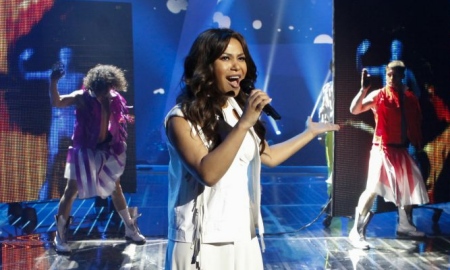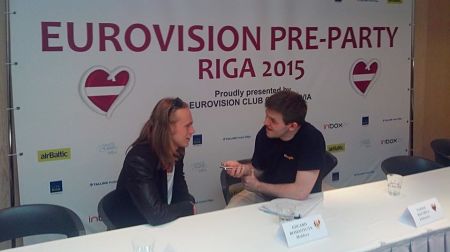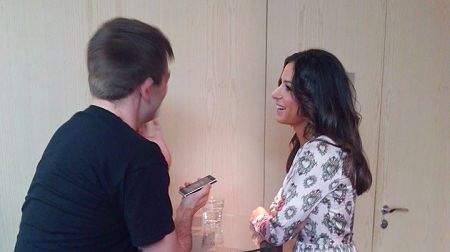With forty countries taking part in the Eurovision Song Contest it may slip the casual viewer that Ukraine will not be taking part in this year’s competition. Citing financial and political problems one of Europe’s largest and most successful Eurovision nations in recent years chose way back in September 2015 to withdraw from the Eurovision edition in Vienna. However Ukraine is still a player in this year’s Song Contest, most obviously through the performance of Ukrainian Eduard Romanyuta who won the Moldovan selection in February. Ben Robertson investigates the Ukrainian involvement in the Contest through past and present and looks at what the future of the blue and yellow nation may have in the future.
With a 100% qualification record Ukraine, and a top 10 conversation rate of 67%, Ukraine has been one of Eurovision’s highest achieving countries ever since their debut in 2003. Throughout their history politics has been a huge and undeniable part of Ukraine’s stage image. In the recently broadcast 60th Anniversary Conference our own Dr. Eurovision Paul Jordan spoke about Eurovision’s role in nation branding with Ukraine one of his focus country’s. Here he argues that Ruslana’s victory song ‘Wild Dances’ showcases a particularly western Ukrainian tradition and that the involvement of politicians in the 2005 selection process led directly to Orange Revolution song ‘Razom Nas Barato’ being chosen. Politicians were vital Paul argued as well to even make Kiev 2005 a reality, as cabinet ministers were called in by President Yushchenko to fix the lack of organisation pre-contest which threatened a last-ditch EBU removal of hosting rights to Ukraine.
Previously for ESC Insight Paul Jordan has extended the scope of political pressure further to the 2007 entry ‘Dancing Lasha Tumbai’ where politicians asked for their own withdrawal in the scope of potential embarrassment. We can further continue by discussing the global environmental themes of ‘Sweet People’ in 2010 and the deep thought process from last year’s entrant Mariya Yaremchuk to switch to an emotional ballad after ‘Tick Tock’ was already selected. Basically, being involved in Eurovision is hugely important from both artistic and political standpoints. The use of Eurovision as a tool to showcase and demonstrate messages of political value is one Ukraine deeply understands.

‘Be My Guest’ created its own controversy in Ukraine with the issue of race being brought up after her selection to the Eurovision Song Contest
Knowing this, and how valiantly Ukraine made sure of a respectable performance in Copenhagen, it was sad to see pressures on Ukraine’s broadcaster led to a very early admission of withdrawal in September last year. Finance is a genuine problem for Ukraine, the conflicts with Russia are one of many reasons for a crash in the value of the Hryvnia, making it now worth half as much as last year in comparison to the Euro. However much of this is also about time and will, with a view taken that such events of ‘fun’ are not really appropriate in a time like this. Last year it was difficult to ignore the Russia/Ukraine situation in Eurovision, if Ukraine was a part of the Contest this year the political context would cast a shadow impossible to avoid.
I Want Your Song Contest Too Much
Ukraine is of course involved in this year’s Eurovision Song Contest like it or not. Completely unrelated to Ukraine’s lack of entry this year neighbouring Moldova decided for the first time to allow foreign entrants into their National Final process. It was a success in raising the profile of Moldova’s selection process and attracting artists from across the continent. However the victory of Ukrainian Eduard Romanyuta was met with controversy as we discovered on the ground in February.
I caught up with Eduard in Riga to discuss his entry into the Moldovan process and why reaching Eurovision was such a big deal for him to risk his reputation (he’s finished 2nd in a televote in the Ukrainian selection already) in another country.
First of all it is a big desire and a big dream from my childhood. I would do everything because I tried already three times in Ukraine and wouldn’t stop until I get there and now my dream came true with the opportunity from Moldova. I am grateful for that.
It is like the first step of building bridges and the first bridge between Ukraine and Moldova and after that I think we will make a lot of work to build bridges with other countries.
For Eduard, now aged 22, he would have grown up around role models like Ruslana and Ani Lorak and looked to their performances for inspiration. Now a pop star in his own right, Eurovision is seen as a promised land and the culmination of dreams and hard work. It is notable that Ukraine have in the past sent many young new stars to the Song Contest further expressing a vision of it being a current competition and one that Ukraine gets to showcase a modern viewpoint of the country to Europe.
I bring up of course Ukraine, asking Eduard what it is like to be an artist there currently. Eduard gives me a well rehearsed answer.
It is a little bit complicated. I really don’t like to talk about that, it is right to talk about Moldova for I am representing there.
With Eduard’s balding manager staring back expressionless at us I don’t decide to pursue this line of interview, but in a sense I had got all I needed. Eduard’s refusal to discuss Ukraine directly is politically smart for an artist with a career in front of them, but it also tells us about the difficulties that exist in a conflict that is tearing communities apart. Truth is, there would be no safe answer for him to give to that question.
The Eurovision Stars Smashing The Political Boundaries
Those people who have been there and done that are not only vocal, they are vivaciously active in the political minefield of Ukraine. Ruslana, the winning artist of the Eurovision Song Contest 2004, took political office in 2006 and in the midst of Kiev’s hosting of Junior Eurovision was involved in protests in the capital which led to her missing the show. Ruslana brings politics alongside many of her public performances, insisting she would be able to make a statement about the political situation whilst being an interval act in Romania’s selection process this year.
Present at the Eurovision PreParty Riga alongside Eduard was another face of modern day politicism in Ukraine, that of Zlata Ognevich. The 29-year-old singer finished 3rd with ‘Gravity’ in Malmö’s competition and nowadays sits as a deputy speaker for the pro-European Radical Party which made stunning gains in the last elections. The annexation of Crimea is particularly painful for Zlata, with her parents resident on the peninsula. Talking to me I ask about the current situation in Ukraine for artists and musicians.
Eurovision is a big platform for artist. After the Eurovision Song Contest Ukrainian artists have big tours and are popular in their countries, and maybe working with some management in Europe, it is a very serious contest for Ukraine.
I think we can make our dream come true in Ukraine, we have more potential, many musicians and now Ukrainian music industry is growing up now – it wasn’t before the revolution. Now Ukranian music is with us, it is ready. People feel now that there are many possibilities for that.
Zlata talks positively, describing a situation returning to some sort of normality coming out of the current messy affairs being played out across the country. I let her continue discussing the possibility of a Ukrainian return to the Contest.
There are many reasons we are not in this year, because of a lot of things, because of war in Ukraine, because it is very difficult political situation in Ukraine. But I hope that next year Ukraine will be a participant. I think of course, Ukraine is one of the greatest countries in Eurovision, we are sending beautiful people, talented and great songs, and it is a very serious contest for us.
It was particularly important for Zlata to broadcast this image of hope for a Ukrainian future. On the post-concert tour I particularly noticed Zlata not taking much attention to the words of our guide, instead carrying her pocket-sized Ukrainian flag around Riga in constant search for the best photo opportunities.
At the event I tried to get a more subjective opinion about Ukraine’s situation by speaking to another member of the press there. Volodymyr Biriukov has worked reporting on six Eurovision Song Contests for regional television in Ukraine and despite not entering this year he was still in Riga for the PreParty. I ask him for an update on the current situation.
If you want to know how people feel right now, they are really sad, Ukraine is not only one country now, it is in two parts – people who support Ukraine and people who do not support Ukraine. It’s because many journalists and TV channels from Russia do something wrong I think for us, show propaganda. It’s really sad, because not only people fighting each other, it is an informational war and many families split.
Even our artists, we have the same problems with Ani Lorak, she supports Russia, she goes to Russia, gives many concerts and takes many awards. Ruslana supports Ukraine, a really nice singer who shows heart and soul of Ukraine.
Ukraine is a country divided, not just by language or culture but also by information and ambitions. Like Zlata, Volodymyr is confident of a return to the Eurovision Song Contest in 2016, but the pressure of politics that will be thrust upon that the shoulders of that artist will be an enormous burden.
Ukraine Will Go Forward, But Can They Control Their Own Destiny?
Being out of Eurovision hurts Ukraine, it takes away one of their most valuable methods to demonstrate they are a successful nation, whether the powers that be are to the east or west. There is a desire from all within the nation to showcase their talent through the Song Contest, and it is still looked upon as a matter of cultural significance and importance. Eduard did not hesistate in revealing he would of course love to have represented Ukraine this year, and that his venture to Chisinau was no more than a convienient stop-over en route to Vienna.
They are also a country that after scandals of song changes and political interferences in years gone by now want to do it correctly. Mariya last year was not permitted to change ‘Tick Tock’ into something more lyrically deep because it would have broken the rules of the selection format, despite the upheaval of Ukrainian politics at the time. The disruption last summer moved Ukraine’s Junior selection process to an isolated ski resort in the west of the country, but still a two week training camp was organised and an international jury of Eurovision winners selected. They followed through, honouring and completing the competition fully despite Ukrainian TV announcing Eurovision withdrawal months before their Junior Eurovision appearance in Malta. I can’t help but see some significance in the title of that song, ‘Spring Will Come,’ to the future of Ukrainian Eurovision.
I am full of hope for Ukraine’s return to the Contest, but the road to success will not be easy. A tightrope will need to be walked over the next few years as the broadcaster has to ensure no song selection becomes used as a political pawn which divides the country further. That is after all what have already seen happen in the way of Serbia and Montenegro, and such a situation arising in Ukraine could be disastrous. We will all be watching with bated breath and we will all be hoping for a solution which allows artistry and songwriting to shine and take the focus on a Eurovision stage next year.
ESC Insight would like to thank Miroslavs Kodis, President of Eurovision Club OGAE Latvia, alongside the support of AirBaltic and LiveRiga, for their help and assistance in making these interviews possible.










